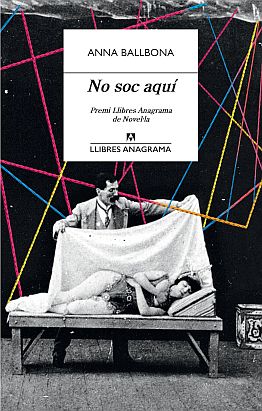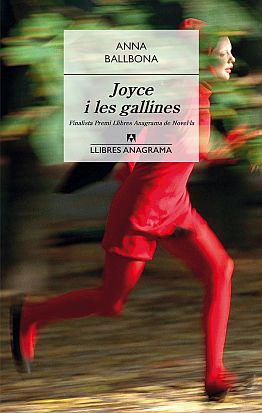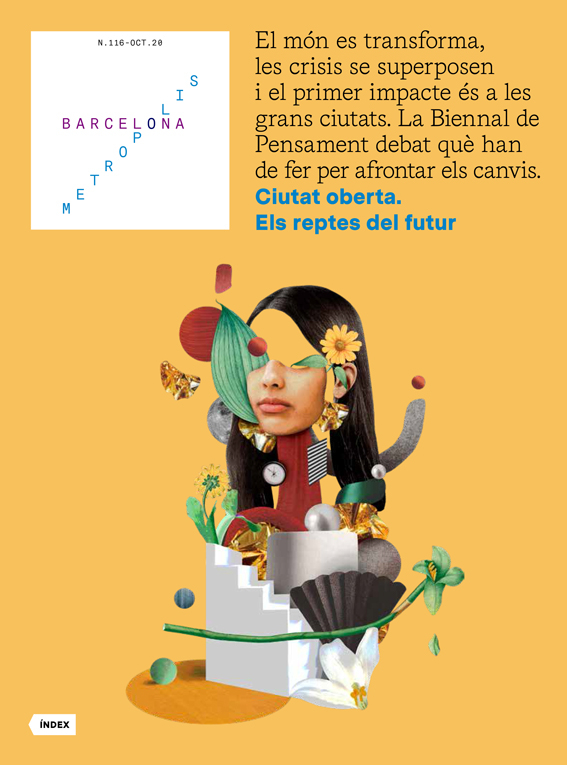Couplets on the night bus
- The Story
- Oct 20
- 8 mins
When her friends started getting into the habit of splitting taxis to get home, for the first time she thought that she’d have to give up the night bus. The scene used to go like this: an evening that went on after a book presentation, an exhibition, with a gathering of different people who share something that shouldn’t be taken for granted: they all have somewhere to sleep in Barcelona. And nobody who puts on that sad face that meant “And now how will you make it home?”, “Do you have to catch the night bus now? and How long will it take?”. And eventually, someone else, very earnestly believing it involved a mountain trek, getting past obstacles and all sorts of animals to reach her town, in the metropolitan area, tells her that she is welcome to sleep over.
She found these reactions amusing at first, but since then it has become commonplace for everyone to go home by taxi (is this what getting older means? Catching yourself unawares in the middle of places where you don’t belong?), her traveller’s luck on the night bus, already past 40, started to worry her.
Maybe it was age indeed; maybe she was now too old to take the night bus like someone half her age, or maybe she had to finally get her driver's licence. This is the other existential mystery that she couldn’t yet explain (or didn’t dare to). You could argue that she hadn’t got her driver’s licence because she was way ahead of her time, because environmental awareness had always stung her. But she’d be making it up. Laziness, a lynchpin that gives almost everyone an excuse, was the reason. Mammoth laziness.
The romantic partners she’s had have helped her, among other things, to conceal the effects of such laziness. They have driven her all over the place and saved her a good few rides on a ramshackle night bus. However, there are days, such as this Friday, when she has a dinner with her workmates and you can already picture her standing on the street Ronda de Sant Pere at a quarter to two in the morning waiting for the bus to take her home after a tedious journey through five towns.
Journeys on night buses give an outline of the urban and psychosocial history of the last twenty years. Of Barcelona and its surroundings. The construction works in Glòries, those of the high-speed train and road closures in villages that forced the bus to take roads with hair-raising bends (or especially terrifying at a certain hour and with a certain amount of alcohol in your stomach and your head). The times when you got a whiff of the stink of weed or hashish, or heard the click of pills, or saw the last dilapidated bars open, later replaced by Pakistani supermarkets. The times of Manu Chao’s mestiza music to reggaeton, techno, Brazilian music and the genre sung by Rosalía. Refusing to go home on the last night bus, that of the stragglers – and spewers splattering the footpath with vomit and staggerers and those resigning themselves to spending the night in a doorway, and the bunch of youngsters shoving each other and yelling, and the first trucks arriving at the warehouse of El Corte Inglés department store – to run to catch the first night bus with the young ones starting to annoy you, speakers cranked up, the usual confusion over whether this is the bus that goes to Barberà or to Parets.
Journeys on night buses give an outline of the urban and psychosocial history of the last twenty years. Of Barcelona and its surroundings.
The impossible conversations with the driver trying to engage passengers in conversation and discuss the news without mincing his words deserve a chapter to themselves: “I’d put all those youngsters to work, you’d see” and she would of course agree, when he could barely hear her over the loud din of the bus with its jerks and jolts. In fact, I’d say that over the years, the tin of the buses makes a more exasperating racket, but you don’t know if it’s because their hearing is going or, in fact, that the buses have been rickety for years. The distortion or deception that our memory subjects us to.
With the drivers she developed a Zen-like patience with a hint of mercantilism: they talked in exchange for dropping her off at a fictional stop closer to home. Then there are the visions of the night: an image, at a certain time, that produces a magnetic effect, of beauty on a canvas of ugliness, which only she can see. The Asland factory that smokes as if it were watching over everyone; the lights aligned on the flats of Santa Coloma like a perfect electrical panel, without fail; some ring road exiting Barcelona that rises and turns as it were a harmonious symphony... Fleeting glimpses of a moment in the night, a fleck in the midst of the marble beam of nights when you’re eager to get home, as it’s already getting late.
This Friday, as her other workmates have gone to find a taxi to take them beyond the Diagonal thoroughfare, she makes her way to Ronda de Sant Pere to take a night bus to the Besòs area. And on the journey, for the first time in a long while, she gets dizzy again. She doesn’t know whether to attribute it to the wine – she hasn’t drunk much, but maybe she doesn’t have as much tolerance anymore – or to the position of the seat she has chosen on the bus – one of those more sunken four-place seats, which made your stomach queasier with every abrupt turn of the steering wheel – or to the bus driver – a guy she didn’t know, who took the roundabouts as if someone were chasing him. She’s had nightmares about it.
The back and forth motion of the driver’s abrupt turns afforded a flashback of twenty years gone by, missing a bus that looked like it was hers.
The back and forth motion of the driver’s abrupt turns afforded a flashback of twenty years gone by, missing a bus that looked like it was hers. She was not used to catching it yet, it was late and she was beginning to fret about not finding a way to get home. She asked the next bus driver if the bus stopped near the town and the driver gave her the same disgruntled yes as if she had asked whether it was going to Rome. She got on and felt like she was on a flying ship, which in an endless lap, stopped in a string of towns she had never been to. When it stopped, the driver had to insist for a selected group of passengers to get off, without kicking up a fuss, and she got up staggering, after a short snooze and still with a bitter taste rising from her stomach into her mouth, and asking if it was far to her nearest town and the driver said it wasn’t, not to worry, he’d let her know, there was another bit to go, always the longest way to get home, but we would get there. And she felt like all the terrifying roundabout turns were increasingly stomach-churning, followed by slams on the brakes so as not to miss a stop, the hollering of those who got off, the frustration of those who wanted to get on but this wasn’t their bus. And all the metaphors that can be encapsulated in a night journey, in complete darkness, only little lights like matches scattered around industrial estates and tertiary roads. And she, who does not know if she is still in a dream or a story by Sylvia Plath, begins to think that it’s her turn to get off, that it’s time, that if she has to, she’ll reach her town on foot, because the return journey is taking too long.
At one point of the dream of a certain spiritual and existential tension, she is told that she has to follow her path, her choices, that from now on she’s the one taking the swerves, because she can take them, despite not having a driving licence; one thing doesn’t cancel out the other. And when she’s almost convinced, her mother appears telling her that at this rate she’ll never get her licence, and she tries to get up to tell her she will, that she’s wrong, just as a roundabout with a dreadful sculpture in the middle diverts her attention to the window and sends her mobile phone and headphones flying onto the floor.
She woke up disoriented and with that silent dread of whether she had passed her town. But no, there are still a couple of stops to go. She’s a bit thirsty and has the aftertaste of the confusion of the dream, which was not just a dream. She felt like it happened to her once, that she had taken the wrong bus and had to walk an hour and a half on roads that were too dark, chomping on the fear but swallowing it back, to get home. When the first night buses to her area started up, she thought that, in a matter of years, everyone would take them and that so many car journeys would come to an end. Predictions are not her specialty. When she reaches her town after an hour and a quarter, she gets off the bus feeling herself to make sure she hadn’t lost anything and that she is still in one piece. She staggers. She suddenly realises that it’s gotten too late for her again.
Recommended publications
 No soc aquíAnna Ballbona. Llibres Anagrama, 2020
No soc aquíAnna Ballbona. Llibres Anagrama, 2020 Joyce i les gallinesAnna Ballbona. Anagrama, 2016
Joyce i les gallinesAnna Ballbona. Anagrama, 2016
The newsletter
Subscribe to our newsletter to keep up to date with Barcelona Metròpolis' new developments




